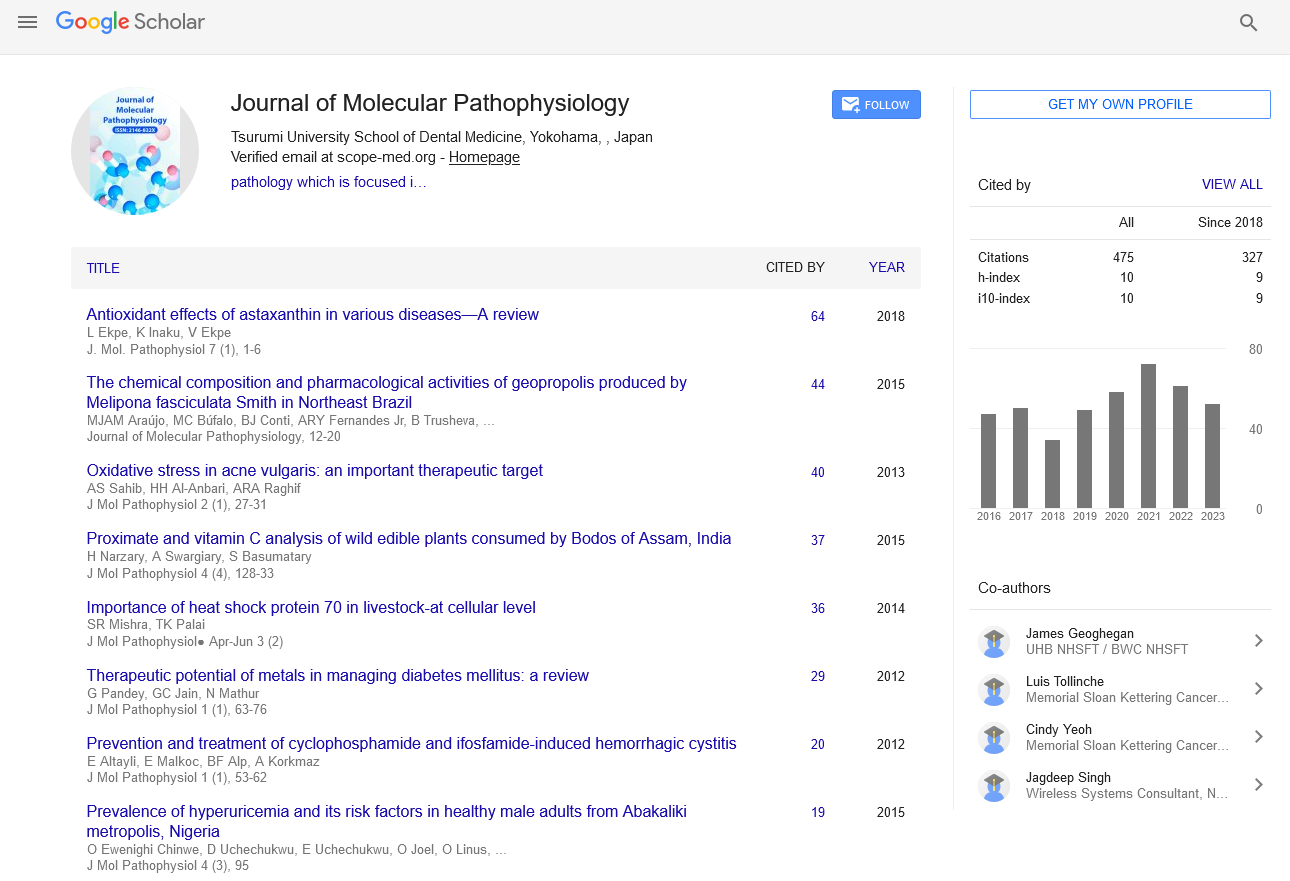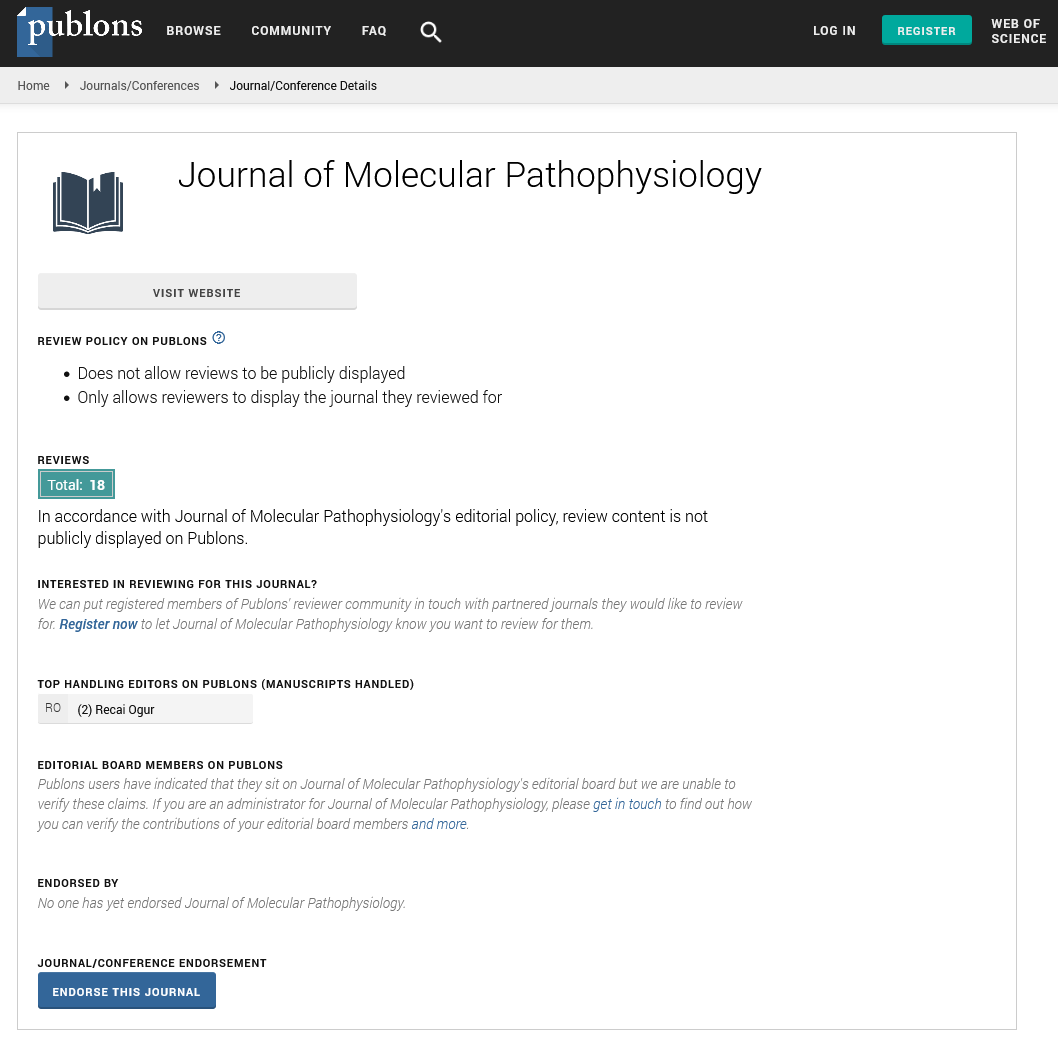Opinion - Journal of Molecular Pathophysiology (2023)
Immunopathology: The Complex Interplay of Immune System
Bing Zheng*Bing Zheng, Department of Immunology, Yangtze University, Jingzhou, China, Email: Zhengb5555@gmail.com
Received: 23-May-2023, Manuscript No. jmolpat-23-100675; Editor assigned: 26-May-2023, Pre QC No. jmolpat-23-100675 (PQ); Reviewed: 12-Jun-2023, QC No. jmolpat-23-100675; Revised: 19-Jun-2023, Manuscript No. jmolpat-23-100675 (R); Published: 26-Jun-2023
About the Study
A subspecialty of medicine called immunopathology examines immunological reactions linked to disease. Immunopathology is a branch of medical science that focuses on studying the effects of the immune system in the development and progression of various diseases. It involves investigating the intricate mechanisms by which the immune system can contribute to both protective and harmful responses in the human body. Immunopathology plays a vital role in understanding the pathogenesis of numerous conditions, ranging from autoimmune disorders to infectious diseases. It encompasses research on how the immune system, immunity, and immunological responses relate to the pathology of an organism, organ system, or illness. It is a term used in biology to describe harm done to an organism as a result of an infection by the organism’s own immune response. It frequently happens when an animal pathogen infects a human and may be caused by a mismatch between the infection and the host species.
The immune system
The immune system is a complex network of cells, tissues, and organs that work collaboratively to defend the body against harmful pathogens, foreign substances, and abnormal cells. It comprises two major components: the innate immune system and the adaptive immune system. The innate immune system provides rapid, nonspecific defense mechanisms, while the adaptive immune system confers specific, long-term immunity through the recognition of antigens.
Immunopathology and autoimmune diseases: Autoimmune diseases occur when the immune system mistakenly attacks the body’s own cells and tissues. Immunopathological mechanisms underlying autoimmune diseases involve the loss of self-tolerance, leading to the production of autoantibodies and the activation of auto reactive T cells. Examples of autoimmune diseases include rheumatoid arthritis, systemic lupus erythematosus, multiple sclerosis, and type 1 diabetes.
Immunopathology and allergic reactions: Allergic reactions are exaggerated immune responses to harmless substances, known as allergens. These reactions involve the activation of immune cells, such as mast cells and basophils, and the release of inflammatory mediators, including histamine. Immunopathology in allergies can range from mild symptoms like itching and sneezing to severe, life-threatening conditions like anaphylaxis. Asthma, allergic rhinitis, and atopic dermatitis are common allergic diseases.
Immunopathology and infectious diseases: Immunopathological processes also play a crucial role in infectious diseases. The immune system responds to invading pathogens by mounting an immune response, which can lead to tissue damage if not regulated properly. Immunopathology is evident in various infectious conditions, such as tuberculosis, malaria, viral hepatitis, and Human Immunodeficiency Virus (HIV) infection. Understanding these immunopathological mechanisms aids in the development of targeted therapies and vaccines.
Immunopathology and cancer: The immune system plays a dual role in cancer development and progression. On one hand, immune cells can recognize and eliminate cancerous cells through a process known as immune surveillance. On the other hand, cancer cells can evade immune detection and establish an immunosuppressive microenvironment, allowing for uncontrolled tumor growth. Immunotherapy, which harnesses the immune system to target cancer cells, has emerged as a promising approach in cancer treatment.
Diagnostic techniques: Immunopathology relies on various diagnostic techniques to assess immune system function and identify specific immune abnormalities. These techniques include immunohistochemistry, flow cytometry, Enzyme-Linked Immunosorbent Assay (ELISA), and Polymerase Chain Reaction (PCR). These tools enable the detection of specific antigens, antibodies, and genetic markers, aiding in the diagnosis and monitoring of Immunopathological conditions.
Therapeutic strategies: Understanding the Immunopathological mechanisms of diseases has led to the development of novel therapeutic strategies. Immunomodulatory drugs, such as corticosteroids, immunosuppressant’s, and biologics, are commonly used to manage autoimmune disorders and prevent excessive immune responses. Furthermore, targeted immunotherapies, including monoclonal antibodies and immune checkpoint inhibitors, have revolutionized cancer treatment, offering new hope to patients.
Copyright: © 2023 The Authors. This is an open access article under the terms of the Creative Commons Attribution Non Commercial Share Alike 4.0 (https://creativecommons.org/licenses/by-nc-sa/4.0/). This is an open access article distributed under the terms of the Creative Commons Attribution License, which permits unrestricted use, distribution, and reproduction in any medium, provided the original work is properly cited.







